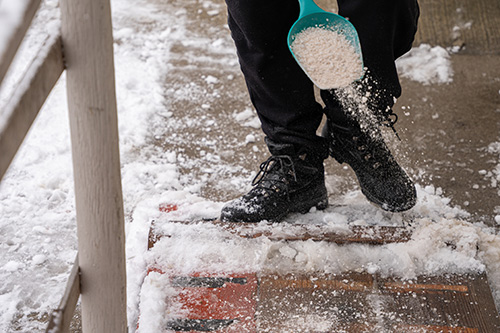
To start, let's look at conventional vs. alternative septic systems.
Standard Septic Systems
In a conventional septic system, gravity carries wastewater from the house into the septic tank and then to the drainfield. Water pools in the tank long enough for ingredients to separate.
The greases and oils that rise to the top as scum and the solids that sink to the bottom as sludge both get removed by a septic pumping company every few years and carted to an approved disposal site. The actual frequency of pumping depends on the tank size and household usage.
The relatively clear water in the middle flows out to the drainfield. This area must be kept free of trees and shrubs so their roots don’t damage it. The drainfield consists of perforated pipes or drain tiles buried in trenches or set on a gravel bed one to three feet below the surface (though some estimates suggest two to four feet, so check your local regulations). As water trickles out of the pipes, the soil and its microbes act as natural filters to clean the water.
Installing a new standard septic system can cost between $3,500 and $8,500, depending on your living location. But it’s not an option for every lot. Public health departments require a certain square footage of open land that's level with or downhill from the house for a standard-system permit. In some states, a state environmental agency handles such matters.
Alternative (Engineered) Septic Systems
Where the soil type, the property size, or proximity to a wetland prohibits a standard system, you’ll need an alternative system. That would be a system with an enhanced septic tank, drainfield, or both. These cost more to install than basic systems, but the prices vary widely, depending on your site, your local environmental codes, and the technology you need.
The following alternative systems help to purify the water more before it gets to the drainfield. That way, you can get by with a smaller drainfield — one in soil that doesn’t drain well — or a site that’s close to a lake or stream and therefore must meet stricter environmental standards.
Aerobic Septic Systems
An aerobic treatment unit installed can cost $10,000 to 20,000. They mix air into the wastewater, which allows oxygen-loving bacteria to flourish. They break down solids much more quickly than the anaerobic bacteria in standard septic tanks, so cleaner water goes into the drainfield. Some units also disinfect the fluid with chlorine or ultraviolet light. That’s an advantage if you live near water, where you may face tighter environmental standards on what your system releases. An aerobic unit can serve as a substitute for a septic tank or work in concert with one.
Sand Filter
Installing a sand filter septic can cost $7,000 to 15,000 and works in conjunction with your tank or aerobic treatment unit. The filter consists of a large buried or above-ground box filled with sand. A pump tank releases the partially clarified water to the top of the sand in measured doses. Water then trickles through the sand before moving into the drainfield. A bottomless sand filter takes things a step further: It doubles as a drainfield alternative by allowing the fluids to pass into the ground underneath.
Drainfield Alternatives
The other main category of alternative treatment systems — which also can be used in conjunction with or instead of standard equipment, depending on your situation — focuses on the drainfield end of the process. These systems help water disperse safely even where soil conditions aren’t great or where there isn’t enough open space for a standard drainfield.
Mound System
A mound system can cost $10,000 to 20,000. A mound septic system is a pile of trucked-in sand and gravel with a drainfield buried inside. It’s used where the soil is thin or has too much clay, or where the water table is too high. Disguising a mound is a major landscaping challenge, especially since you can’t use trees or shrubs, which might have invasive roots.
Drip Irrigation
This type of alternative septic system can cost $6,500 to $15,000. It's a shallow drainfield where water trickles out over a wide area in measured doses from a pump chamber. Installers can snake the flexible piping around trees and shrubs, which makes it easier to fit the drainfield into an established landscape. Because the piping is just six inches to eight inches below ground, though, you might need to purify the water first, perhaps with an aerobic unit. You’ll also need a filter and regular maintenance to keep the system from clogging.
For more information, contact Morse Engineering and Construction.
Source: houselogic.com









